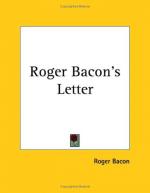|
This section contains 7,233 words (approx. 25 pages at 300 words per page) |

|
SOURCE: "The Universal Science of Roger Bacon," in Roger Bacon and His Search for a Universal Science: A Reconsideration of the Life and Work of Roger Bacon in the Light of His Own Stated Purposes, Columbia University Press, 1952, pp. 167-85.
In the following excerpt, Easton sketches the philosophy of science "which Bacon took for granted as his intellectual framework, but himself never stated in formal terms.'
It has sometimes been supposed that the science of Roger Bacon is full of contradictions. He believed in revealed and experimental knowledge at the same time; he thought of theology as the queen of sciences and the crown of all knowledge. Even George Sarton, who has understood Bacon in many ways so well, seems to think that his 'fundamentalism' was somehow at variance with his scientific vision, a kind of atavism that he had not yet thrown off in spite of...
|
This section contains 7,233 words (approx. 25 pages at 300 words per page) |

|


